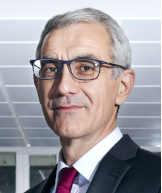It was a real honour for me, and for the Directorate as a whole, to welcome the public to CERN Science Gateway on 24 April to discuss the Future Circular Collider (FCC) Feasibility Study. The evening was naturally an opportunity to talk about CERN and its future, but above all to listen to the audience and to continue the ongoing dialogue on the FCC study that began several years ago with first the French and Swiss authorities and then local representatives.

The FCC study is a flagship initiative for CERN and its future, but also for the future of humanity and the local region. The evening was an opportunity to forge links and share experiences about what CERN does and how it does it, often very well, sometimes less well, but always with a view to improving things, to advancing science and to developing innovative technologies for the benefit of society as a whole.
I took part in the discussions not only as Director for Finance and Human Resources but also as an engaged citizen, because debate on such projects lies at the heart of democracy. The discussion was constructive – some audience members raised legitimate concerns and others highlighted the long-term benefits for the region. Everyone showed a willingness to discuss all the issues. By extending the event’s duration, we addressed as many questions as possible, and discussions with some attendees continued even after the event.

As CERN celebrates its 70th anniversary, it’s important to underline that the CERN community is intrinsically woven into the fabric of the local community. Members of the CERN community do not just work in the region, they live here and are involved in its political, economic and community life. They share the legitimate concerns of people in the region and their analysis of local and global issues. Whether they are young people, workers, retirees or members of associations, they share the same aspirations, the same concerns and the same hopes as their neighbours.
CERN also listens to its personnel. The recent 2023 Engagement Survey showed how passionately the CERN community cares about the Laboratory’s future, highlighting the desire for better knowledge and clearer plans, as well as clearer communication. The Directorate is fully committed to addressing this. In particular, the Director-General led a dedicated CERN community meeting on the FCC Feasibility Study. Since that meeting, key FCC facts have been published online, distilled from a dedicated issue of the CERN Courier.
In line with the aspirations expressed by both the local and CERN communities, we are also fully committed to environmentally responsible research, with CERN’s biennial public environment reports outlining the ambitious, realistic and measurable targets we have set to control energy consumption, reduce emissions and water consumption and more. CERN is one of the first scientific laboratories to have obtained ISO 50001 certification for energy management, which is testament to how far we have come and to the seriousness of our commitment for the future. CERN’s exceptional and world-renowned R&D in superconductivity could even one day be a cornerstone of a major revolution in energy transport or the invention of clean aircraft for the future.
For all the projects that are supported by CERN, an environmental impact assessment is carried out to the highest standards. The same applies to the FCC study. With the ongoing Feasibility Study set to deliver its report in 2025, I look forward to more dialogue and the chance to meet people, to discuss points of view, to reshape and improve our projects and to build a shared future together.

